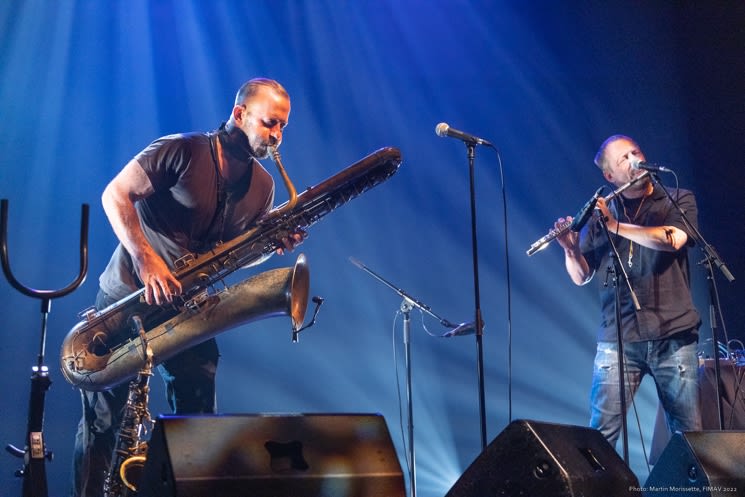After taking 2020 off and then featuring a slightly smaller and geographically limited version in 2021, it seems that securing the "International" part of Festival International Music Actuelle Victoriaville still poses some problems. A month before the festival's launch, Spanish singer Fátima Miranda cancelled for personal reasons and was replaced by returning favourite Koichi Makigami, who last appeared back in 2013 with his group Hikashu.
A bigger blow was the last-minute cancellation by Ukrainian septet Dakh Daughters. Originally scheduled to appear in 2020, the theatrical ensemble's appearance this year was clearly a much more emotionally charged affair given the current political situation in their country. But due to "family situations, the war in Ukraine, the unrelenting pandemic, and visa issues" the group had to pull out a day before their performance.
Still, the mood at the festival — which took over venues in Victoriaville, QC, from May 19 to 22 — was wry and upbeat, even if a little hampered by the slow return to normalcy. Organizer Michel Levasseur, who introduces each performance, welcomed back "the English audience" from the stage on opening night, recognizing the long-standing regulars from outside Quebec and Canada who made their first pilgrimage back to FIMAV since 2019. The festival rewarded those returning faithfully with a full slate of mind-bending performances.
May 19
Nadah el Shazly
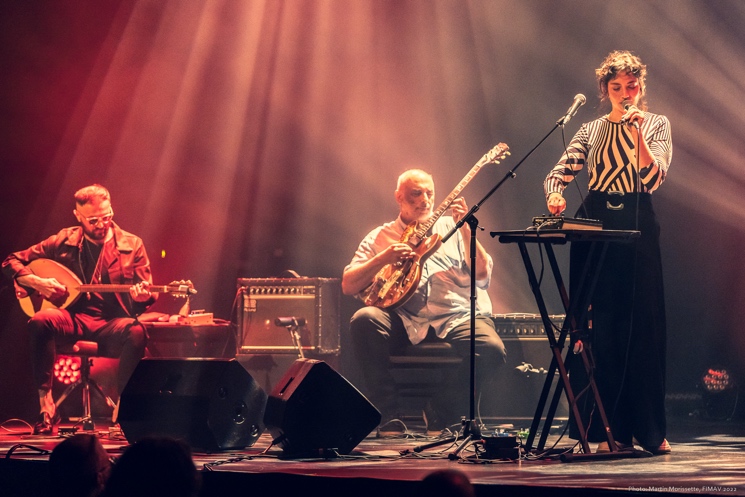
A recent transplant to Montreal from Cairo, Nadah el Shazly brought a heavy quartet to play with her at FIMAV. Sam Shalabi on guitar, Radwan Moumneh on buzuk and Sarah Pagé on harp showered el Shazly with a torrent of iridescent notes and feedback while bassist Jonah Fortune provided the structured pulse to find her pieces safe passage. Flowing atop these waves, the vocalist delivered a future facing take on traditional classic Egyptian music. Shalabi, who was a key figure in bringing her 2017 album Ahwar to completion, was especially mesmerizing as he painted a landscape of colourfully varied guitar noise behind each piece. Harpist Pagé also shone as she led the closing lullaby with el Shazly, though it was a lullaby not without its occasional hypnic jerks.
William Parker
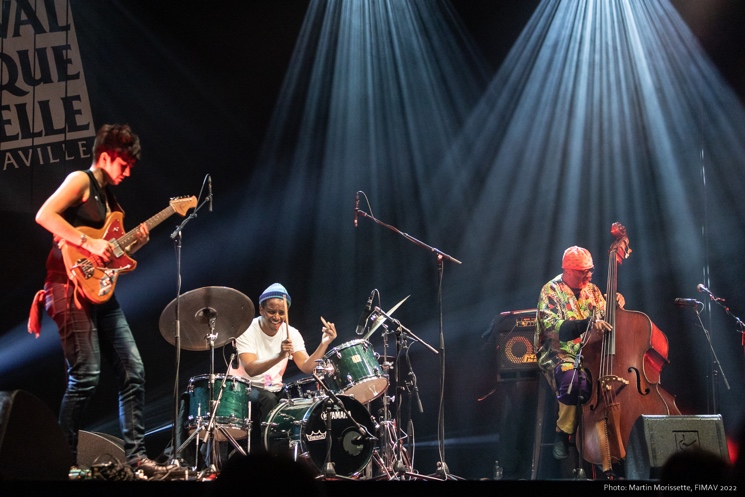
Longtime friend of the festival William Parker generously provided a last-minute substitution for the cancelled Dakh Daughters concert, bringing Francisco Mela to join his Mayan Space Station, which also included guitarist Ava Mendoza, who was already in town for another performance. Mela filled the drum spot originally occupied by Gerald Cleaver on Parker's 2021 album, bringing a dexterity and variety of techniques that meshed with Parker's sure-handed bass work. It was Mendoza's guitar that cracked the night, though, with a blistering electric attack that welded rock music structures with the fire of free jazz improvisation. For a band that had no plan to play 48 hours before, they proved their various instincts were in cosmic alignment.
May 20
No Hay Banda / Ida Toninato / Navid Navab
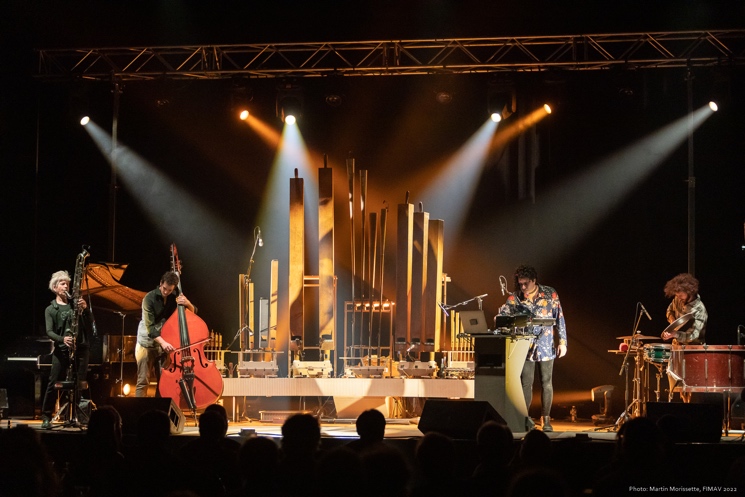
A Montreal music collective formed in 2016, No Hay Banda are the new kids of new music. In the first half of their performance, the full seven-piece group presented a composition called À travers le temps, entre les bruits by Montreal saxophonist and rising star Ida Toninato. The piece easily and engagingly flowed through three sections that began with fractured and plosive sounds rendered by bowed and woodwind instruments, as well as vocals by Sarah Albu and ondes Martnenot by Daniel Áňez. Eventually, drones and overtones emerged, recalling the meditative deep worlds of Tony Conrad's Outside the Dream Syndicate, before developing into harmonics and musical forms. It felt like not only a share musical discovery, but also a symbolic knitting back together of people in celebration of art. For the second half of the performance, the group stripped down to a trio and were joined by veteran clarinetist Lori Freedman and composer Navid Navab for Organism: In Turbulence. The literal centrepiece of Navab's piece was a sculpture assembled from reclaimed pieces of a Casavant organ from the turn of the 20th century. Triggered by cues from an array of digital devices, the pipes slowly delivered rumbles across several frequencies. The anticipation created by seeing the sculpture sit quietly for nearly an hour was not entirely satisfied by its eventual activation. It lacked a physicality promised by its visual imposition — a little like seeing a cannon sit on stage only to have it used as a smoke machine rather than an explosive presence.
Sean Noonan Pavees Dance
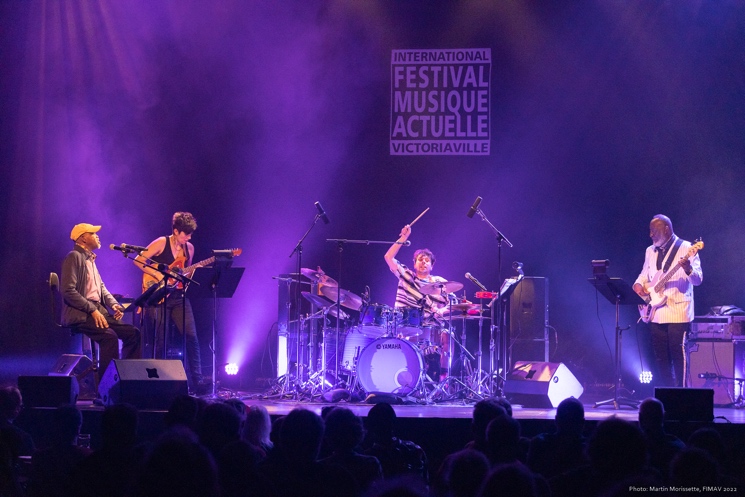
Originally slated for an appearance at the 2020 festival, the world premiere performance of drummer and "rhythmic storyteller" Sean Noonan's 2019 album Tan Man's Hat was delayed due to the pandemic. The wait was rewarded as Noonan was joined by group members and musical legends: bassist Jamaaladeen Tacuma, familiar to most as a member of Ornette Coleman's Prime Time, and vocalist Malcolm Mooney, the original singer from krautrock giants Can. Rounding out the ensemble was fiery guitarist Ava Mendoza, returning in a more rigorously scripted but no less pyrotechnic capacity than her accompanying of William Parker the previous night. Noonan's music and stage persona channelled all manner of tricksters from Zappa (who he has rendered in opera with his jazz/punk group the Hub), to Deerhoof, Sun Ra, John Lydon and even Bugs Bunny. With his joyful, endlessly energetic and genre-crossing approach to drumming, he was clearly bursting with glee as he directed the towering bass monolith Tacuma into the realms of quasi-metal overdrive. It was a truly cosmic and poetic experience, punctuated by no small amount of onstage merch promotion, tongue mostly in cheek.
René Lussier
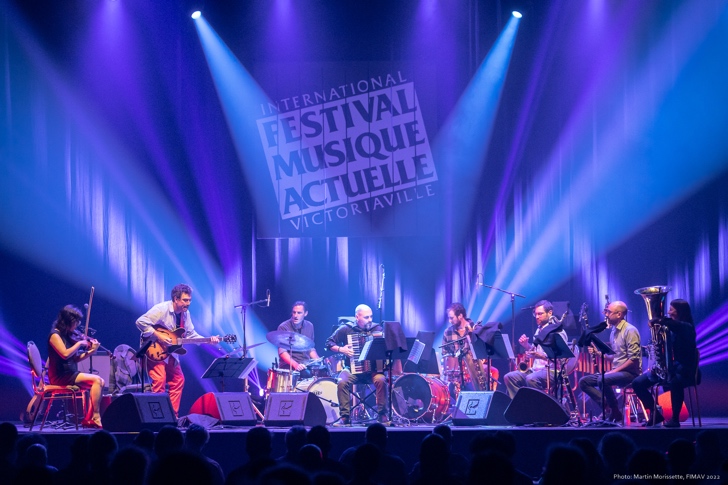
Guitarist René Lussier has the distinction of having appeared, nearly four decades ago, at the very first FIMAVm as well as having the first release on the festival's Victo label. But despite being teased by the organizers for approaching retirement age, Lussier is a vital creative force, assembling an eight-piece group to interpret a series of new compositions that were the most precise and accomplished, and possibly also the most danceable, of the festival so far. As usual, hinted elements of both Quebec folklore and Roma jazz are the glue that binds his work, highlighted by the choice of instrumentation that included Luzio Altobelli on accordion, Alissa Cheung on violin and Julie Houle on tuba. As a bandleader, Lussier preferred to sit amidst his group, providing the spark that ignited each energetic element and trusting each member to find their interlocking puzzle pieces. Even when Koichi Makigami appeared with an animated improvised vocal, nothing could knock this well-tuned machinery off its axis.
May 21
Mats Gustafsson / David Grubbs / Rob Mazurek
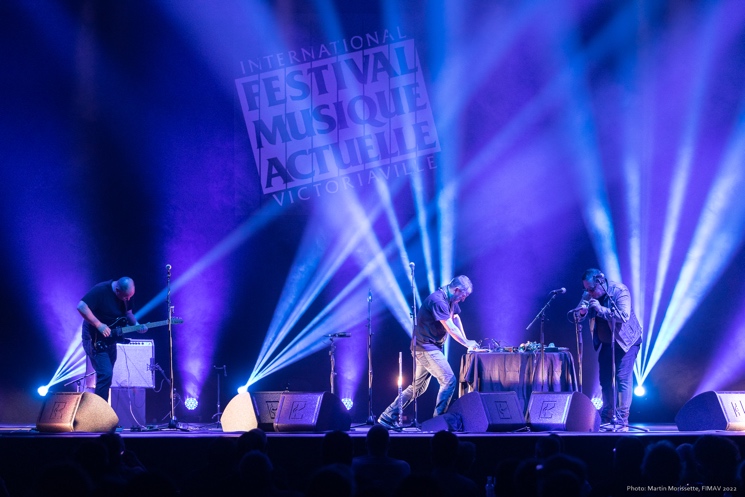
This trio has origins in three different but eventually overlapping worlds that converged in Chicago circa 1990s, crossing boundaries between post-rock, free jazz and world music. Grubbs and Gustafsson previously collaborated on two recordings for Grubbs's Blue Chopsticks label, but the trio first convened in 2019 to perform at the Underflow art gallery in Athens, Greece, the name adopted for the recording and subsequent presentations. There was a grab-bag variety to the approach, with Gustafsson's explosive technique — with both wind instruments and electronics — setting the tone early on and Mazurek adding detail and texture with trumpet and his own arsenal of electronics. Grubbs initially navigated his guitar in swells between the two before stepping to the microphone to contribute two songs that were unexpected in the mostly improvisational context, but were also easily the highlight of the show. A strong closing improv saw the trio using the entire space of the stage to dispense clusters of notes while a sinus-rattling electronic pulse gradually subsided in volume.
Franck Vigroux
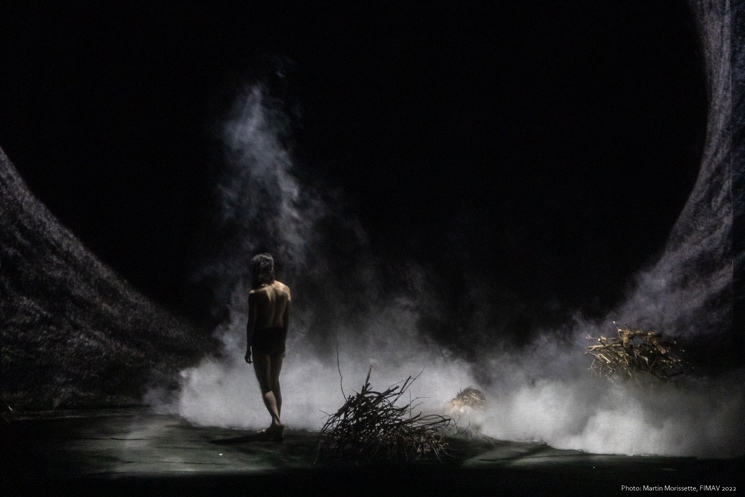
Electroacoustic music is an academic wing of composition that can often seem impenetrable to the casual listener, but French artist Franck Vigroux crosses his ambient and often deeply disquieting themes with the world of digital imagery and dance — if not to allow simpler access to the ideas, to at least broaden the context of his work. The performance involved a slowly unfolding, vaguely evolutionary sequence featuring dancer Azusa Takeuchi's shedding of a porcupine-like costume. The dim lighting, combined with a flow of abstract images screened behind the stage, effectively played with vision's depth and the mind's willingness to unravel suggestive rather than wholly representational imagery. Comparisons to 2001: A Space Odyssey or even British filmmaker Ben Wheatley's recent cosmic horrors are easy, but Vigroux and company's work brought them forward in a multidimensional, engrossing and individual manner.
Mary Halvorson
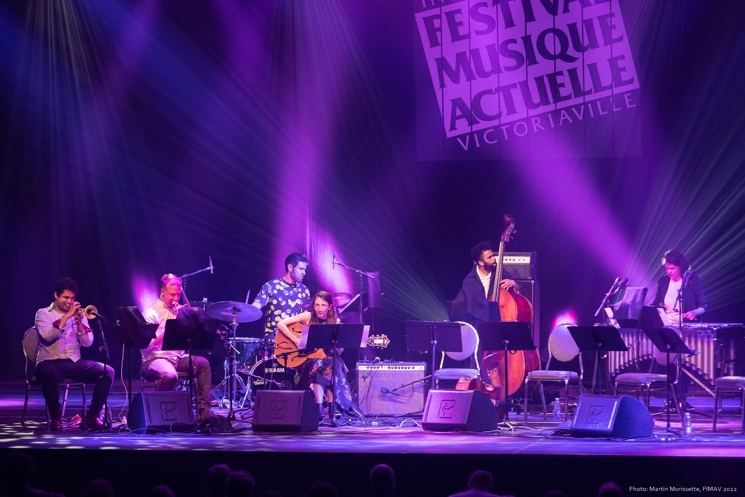
Bringing the Canadian premiere of her two just-released Nonesuch label albums to FIMAV, Mary Halvorson continues to prove her status as a generational exemplar in new music. Beginning with Belladonna, Halvorson was joined by Mivos String Quartet for a series of pieces that crossed the boundaries of chamber classical into a hybridized combination of modern improv and early jazz. Amaryllis features Halvorson's new jazz sextet, and their portion featured a much looser limbed interplay flirting with soul and funk forms, highlighted by contributions from trumpeter Adam O'Farrill and vibraphonist Patricia Brenna. Mivos returned for the last section, swelling the ranks to a 10-piece that performed pieces flowing with rich detail yet unfussy in their structure, recalling polyvalent soundtracks by '70s legends like Bernard Herrmann. Halvorson's genius at composition is matched by her generosity in choosing to highlight her ensemble's strengths rather than drawing the spotlight onto her own guitar work.
May 22
Pangea De Futura
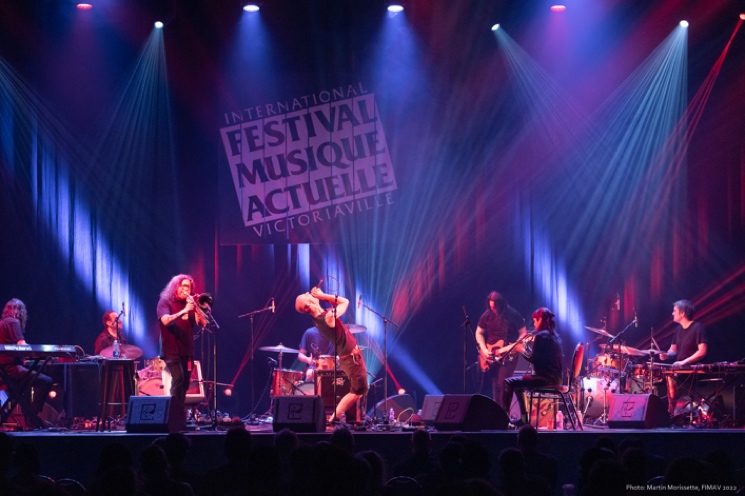
Eric Quach (Thisquietarmy) assembled Pangea De Futura in 2019, built around an engine of drummers: Aidan Girt of Godspeed You! Black Emperor, Eric Craven of Hrsta, and Samuel Bobony of Avec le Soleil Sortant de sa Bouche. For this pandemic relaunch of sorts, Quach and keyboardist Charles Bussières provided an expanse of tone and drone for the engine to inhabit and explore, aided by a trio of vocalists and brass players: Noboysha Rakic, Reüel Ordoňez and Véronique Janosy. If the performance had a weakness, it was perhaps the repetitive nature of ornamentation provided by these three, though Rakic's theatrical presence did offer a welcome focal point for the sensory turmoil the band was creating. Continental collision was achieved in three rises and falls that touched on dark ambient, space rock and occasional bursts of straight-up metal. The group, in line with their pedigree, managed to express a now trademark Montreal brand of unease tinged with creative raging against the dying of the light.
Colin Stetson / Mats Gustafsson
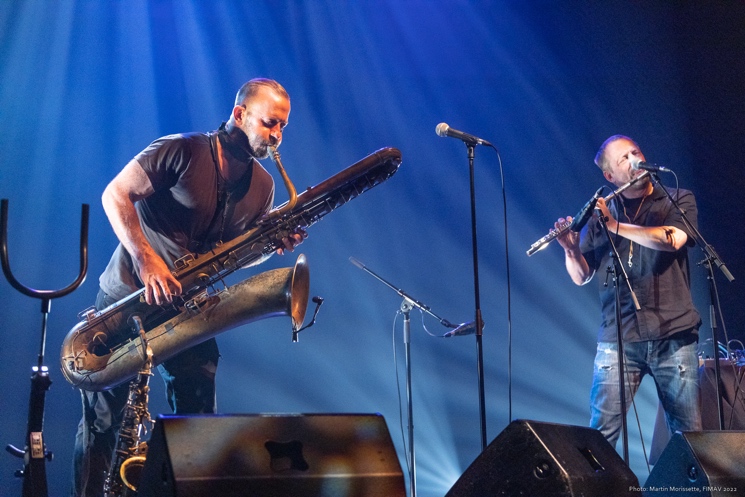
Stetson and Gustafsson shared a stage for the first time a little more than a decade ago at the 2011 Vancouver Jazz Fest, and having crossed paths a few times since, they have clearly learned each other's very specific saxophone vernacular. While Gustafsson is better known as an improviser, Stetson proved his adaptability throughout the performance, taking advantage of Gustafsson's growing interest in electronic soundscapes to hold aloft his dense saxophone loop structures. When the two did combine woodwinds, the results were at times surprisingly hushed and thoughtful, verging into melodic territory from time to time. But there were also fires to stoke and eruptions to set off. The set surely satisfied both those who love pyrotechnics and those who like to lean in closer.
Gordon Grdina
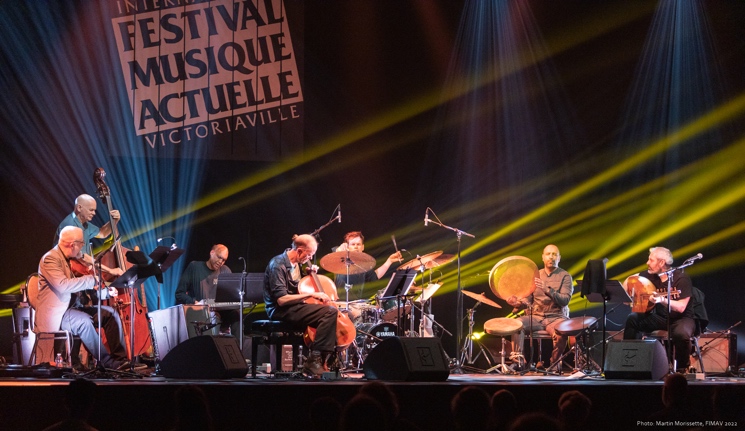
Vancouver's Gordon Grdina brought not one but two quartets to close out FIMAV this year. First up was the Marrow, an exploration of Arab and Persian themes featuring Grdina on the oud, and joined by Mark Hellias on bass, Hank Roberts on cello and Hamin Honari on percussion. Most impressive was Hellias and Roberts's pliability, turning instruments generally associated with Western music towards Eastern scales. Their interpretations were filled with emotion and verve, not to mention good humour. Square Peg was a more traditionally improv jazz ensemble that featured heavyweights Mat Maneri on viola and Shahzad Ismaily on bass. Filling out the quartet was German drummer Christian Lillinger, whose style approximated a Jack Russell terrier on a sugar high. While technically unimpeachable, his "most drumming" approach tended to overwhelm the space, draining the air between all the other players' notes. Bringing together all seven musicians for two final pieces, Grdina pinched together both musical modes into a seamless whole with fabulous results, ending the festival on a high.
A bigger blow was the last-minute cancellation by Ukrainian septet Dakh Daughters. Originally scheduled to appear in 2020, the theatrical ensemble's appearance this year was clearly a much more emotionally charged affair given the current political situation in their country. But due to "family situations, the war in Ukraine, the unrelenting pandemic, and visa issues" the group had to pull out a day before their performance.
Still, the mood at the festival — which took over venues in Victoriaville, QC, from May 19 to 22 — was wry and upbeat, even if a little hampered by the slow return to normalcy. Organizer Michel Levasseur, who introduces each performance, welcomed back "the English audience" from the stage on opening night, recognizing the long-standing regulars from outside Quebec and Canada who made their first pilgrimage back to FIMAV since 2019. The festival rewarded those returning faithfully with a full slate of mind-bending performances.
May 19
Nadah el Shazly

A recent transplant to Montreal from Cairo, Nadah el Shazly brought a heavy quartet to play with her at FIMAV. Sam Shalabi on guitar, Radwan Moumneh on buzuk and Sarah Pagé on harp showered el Shazly with a torrent of iridescent notes and feedback while bassist Jonah Fortune provided the structured pulse to find her pieces safe passage. Flowing atop these waves, the vocalist delivered a future facing take on traditional classic Egyptian music. Shalabi, who was a key figure in bringing her 2017 album Ahwar to completion, was especially mesmerizing as he painted a landscape of colourfully varied guitar noise behind each piece. Harpist Pagé also shone as she led the closing lullaby with el Shazly, though it was a lullaby not without its occasional hypnic jerks.
William Parker

Longtime friend of the festival William Parker generously provided a last-minute substitution for the cancelled Dakh Daughters concert, bringing Francisco Mela to join his Mayan Space Station, which also included guitarist Ava Mendoza, who was already in town for another performance. Mela filled the drum spot originally occupied by Gerald Cleaver on Parker's 2021 album, bringing a dexterity and variety of techniques that meshed with Parker's sure-handed bass work. It was Mendoza's guitar that cracked the night, though, with a blistering electric attack that welded rock music structures with the fire of free jazz improvisation. For a band that had no plan to play 48 hours before, they proved their various instincts were in cosmic alignment.
May 20
No Hay Banda / Ida Toninato / Navid Navab

A Montreal music collective formed in 2016, No Hay Banda are the new kids of new music. In the first half of their performance, the full seven-piece group presented a composition called À travers le temps, entre les bruits by Montreal saxophonist and rising star Ida Toninato. The piece easily and engagingly flowed through three sections that began with fractured and plosive sounds rendered by bowed and woodwind instruments, as well as vocals by Sarah Albu and ondes Martnenot by Daniel Áňez. Eventually, drones and overtones emerged, recalling the meditative deep worlds of Tony Conrad's Outside the Dream Syndicate, before developing into harmonics and musical forms. It felt like not only a share musical discovery, but also a symbolic knitting back together of people in celebration of art. For the second half of the performance, the group stripped down to a trio and were joined by veteran clarinetist Lori Freedman and composer Navid Navab for Organism: In Turbulence. The literal centrepiece of Navab's piece was a sculpture assembled from reclaimed pieces of a Casavant organ from the turn of the 20th century. Triggered by cues from an array of digital devices, the pipes slowly delivered rumbles across several frequencies. The anticipation created by seeing the sculpture sit quietly for nearly an hour was not entirely satisfied by its eventual activation. It lacked a physicality promised by its visual imposition — a little like seeing a cannon sit on stage only to have it used as a smoke machine rather than an explosive presence.
Sean Noonan Pavees Dance

Originally slated for an appearance at the 2020 festival, the world premiere performance of drummer and "rhythmic storyteller" Sean Noonan's 2019 album Tan Man's Hat was delayed due to the pandemic. The wait was rewarded as Noonan was joined by group members and musical legends: bassist Jamaaladeen Tacuma, familiar to most as a member of Ornette Coleman's Prime Time, and vocalist Malcolm Mooney, the original singer from krautrock giants Can. Rounding out the ensemble was fiery guitarist Ava Mendoza, returning in a more rigorously scripted but no less pyrotechnic capacity than her accompanying of William Parker the previous night. Noonan's music and stage persona channelled all manner of tricksters from Zappa (who he has rendered in opera with his jazz/punk group the Hub), to Deerhoof, Sun Ra, John Lydon and even Bugs Bunny. With his joyful, endlessly energetic and genre-crossing approach to drumming, he was clearly bursting with glee as he directed the towering bass monolith Tacuma into the realms of quasi-metal overdrive. It was a truly cosmic and poetic experience, punctuated by no small amount of onstage merch promotion, tongue mostly in cheek.
René Lussier

Guitarist René Lussier has the distinction of having appeared, nearly four decades ago, at the very first FIMAVm as well as having the first release on the festival's Victo label. But despite being teased by the organizers for approaching retirement age, Lussier is a vital creative force, assembling an eight-piece group to interpret a series of new compositions that were the most precise and accomplished, and possibly also the most danceable, of the festival so far. As usual, hinted elements of both Quebec folklore and Roma jazz are the glue that binds his work, highlighted by the choice of instrumentation that included Luzio Altobelli on accordion, Alissa Cheung on violin and Julie Houle on tuba. As a bandleader, Lussier preferred to sit amidst his group, providing the spark that ignited each energetic element and trusting each member to find their interlocking puzzle pieces. Even when Koichi Makigami appeared with an animated improvised vocal, nothing could knock this well-tuned machinery off its axis.
May 21
Mats Gustafsson / David Grubbs / Rob Mazurek

This trio has origins in three different but eventually overlapping worlds that converged in Chicago circa 1990s, crossing boundaries between post-rock, free jazz and world music. Grubbs and Gustafsson previously collaborated on two recordings for Grubbs's Blue Chopsticks label, but the trio first convened in 2019 to perform at the Underflow art gallery in Athens, Greece, the name adopted for the recording and subsequent presentations. There was a grab-bag variety to the approach, with Gustafsson's explosive technique — with both wind instruments and electronics — setting the tone early on and Mazurek adding detail and texture with trumpet and his own arsenal of electronics. Grubbs initially navigated his guitar in swells between the two before stepping to the microphone to contribute two songs that were unexpected in the mostly improvisational context, but were also easily the highlight of the show. A strong closing improv saw the trio using the entire space of the stage to dispense clusters of notes while a sinus-rattling electronic pulse gradually subsided in volume.
Franck Vigroux

Electroacoustic music is an academic wing of composition that can often seem impenetrable to the casual listener, but French artist Franck Vigroux crosses his ambient and often deeply disquieting themes with the world of digital imagery and dance — if not to allow simpler access to the ideas, to at least broaden the context of his work. The performance involved a slowly unfolding, vaguely evolutionary sequence featuring dancer Azusa Takeuchi's shedding of a porcupine-like costume. The dim lighting, combined with a flow of abstract images screened behind the stage, effectively played with vision's depth and the mind's willingness to unravel suggestive rather than wholly representational imagery. Comparisons to 2001: A Space Odyssey or even British filmmaker Ben Wheatley's recent cosmic horrors are easy, but Vigroux and company's work brought them forward in a multidimensional, engrossing and individual manner.
Mary Halvorson

Bringing the Canadian premiere of her two just-released Nonesuch label albums to FIMAV, Mary Halvorson continues to prove her status as a generational exemplar in new music. Beginning with Belladonna, Halvorson was joined by Mivos String Quartet for a series of pieces that crossed the boundaries of chamber classical into a hybridized combination of modern improv and early jazz. Amaryllis features Halvorson's new jazz sextet, and their portion featured a much looser limbed interplay flirting with soul and funk forms, highlighted by contributions from trumpeter Adam O'Farrill and vibraphonist Patricia Brenna. Mivos returned for the last section, swelling the ranks to a 10-piece that performed pieces flowing with rich detail yet unfussy in their structure, recalling polyvalent soundtracks by '70s legends like Bernard Herrmann. Halvorson's genius at composition is matched by her generosity in choosing to highlight her ensemble's strengths rather than drawing the spotlight onto her own guitar work.
May 22
Pangea De Futura

Eric Quach (Thisquietarmy) assembled Pangea De Futura in 2019, built around an engine of drummers: Aidan Girt of Godspeed You! Black Emperor, Eric Craven of Hrsta, and Samuel Bobony of Avec le Soleil Sortant de sa Bouche. For this pandemic relaunch of sorts, Quach and keyboardist Charles Bussières provided an expanse of tone and drone for the engine to inhabit and explore, aided by a trio of vocalists and brass players: Noboysha Rakic, Reüel Ordoňez and Véronique Janosy. If the performance had a weakness, it was perhaps the repetitive nature of ornamentation provided by these three, though Rakic's theatrical presence did offer a welcome focal point for the sensory turmoil the band was creating. Continental collision was achieved in three rises and falls that touched on dark ambient, space rock and occasional bursts of straight-up metal. The group, in line with their pedigree, managed to express a now trademark Montreal brand of unease tinged with creative raging against the dying of the light.
Colin Stetson / Mats Gustafsson

Stetson and Gustafsson shared a stage for the first time a little more than a decade ago at the 2011 Vancouver Jazz Fest, and having crossed paths a few times since, they have clearly learned each other's very specific saxophone vernacular. While Gustafsson is better known as an improviser, Stetson proved his adaptability throughout the performance, taking advantage of Gustafsson's growing interest in electronic soundscapes to hold aloft his dense saxophone loop structures. When the two did combine woodwinds, the results were at times surprisingly hushed and thoughtful, verging into melodic territory from time to time. But there were also fires to stoke and eruptions to set off. The set surely satisfied both those who love pyrotechnics and those who like to lean in closer.
Gordon Grdina

Vancouver's Gordon Grdina brought not one but two quartets to close out FIMAV this year. First up was the Marrow, an exploration of Arab and Persian themes featuring Grdina on the oud, and joined by Mark Hellias on bass, Hank Roberts on cello and Hamin Honari on percussion. Most impressive was Hellias and Roberts's pliability, turning instruments generally associated with Western music towards Eastern scales. Their interpretations were filled with emotion and verve, not to mention good humour. Square Peg was a more traditionally improv jazz ensemble that featured heavyweights Mat Maneri on viola and Shahzad Ismaily on bass. Filling out the quartet was German drummer Christian Lillinger, whose style approximated a Jack Russell terrier on a sugar high. While technically unimpeachable, his "most drumming" approach tended to overwhelm the space, draining the air between all the other players' notes. Bringing together all seven musicians for two final pieces, Grdina pinched together both musical modes into a seamless whole with fabulous results, ending the festival on a high.
